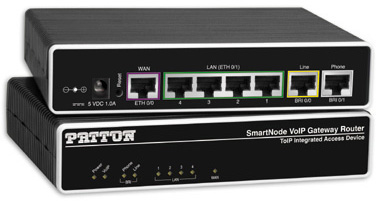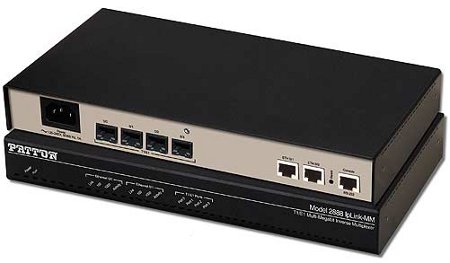Linux-based IP and VoIP routers gain embedded database
May 12, 2011 — by Eric Brown — from the LinuxDevices Archive — 3 viewsMcObject announced a design win for its in-memory ExtremeDB database management system, which will be integrated across dozens of Linux-based IPLink IP routers and SmartNode voice-over-IP (VoIP) routers from Patton Electronics. Patton is adopting ExtremeDB as a component of its Linux-based Trinity AE distribution to manage configuration data on the routers, says the company.
By the end of Patton Electronics' planned deployment, ExtremeDB will reside in dozens of networking devices from the 26-year old Gaithersburg, Maryland firm, says McObject. These include the IPLink line of T1, broadband, and DSL routers, as well as the company's SmartNode session border control VoIP routers. The latter include the SmartNode 4552 BRI gateway router pictured below.

Patton SmartNode 4552
Patton wanted to replace Trinity's open source CORBA software component, which it previously used to manage configuration data, according to McObject. The goal was to find an off-the-shelf embedded database that could improve scalability and performance while minimizing demands for memory, storage, and CPU resources, says the company.
After reviewing several such products, Patton opted for ExtremeDB. In addition to meeting the above criteria, a key deciding factor was said to be ExtremeDB's event notifications feature. When configuration data change, Trinity uses the feature to inform device management software components, so that these components can apply the changes.
"It was critical for us to have a change from one process trigger an event in another process," stated Ken Kassing, Patton Electronics' chief software engineer. Kassing added that the availability of database system source code, as well as McObject's support staff, helped to seal the deal.
ExtremeDB's tiny, approximately 150KB code size and minimal CPU demands reduce hardware requirements, thereby lowering manufacturing costs, claims McObject. The Linux-compatible software is aimed at both embedded and real-time transaction processing applications, and is said to support transactions, concurrent access, and a high-level data definition language.
ExtremeDB 4.1, which shipped a year ago, added CRC and RC4 encryption, faster on-disk storage and retrieval, a binary scheme option, support for custom collations, and improved transaction logging. In March, McObject announced a design win with Airspan Networks, which is using ExtremeDB for its Air4G 4G base station.
Patton's Linux-based IPLink and SmartNode routers
LinuxDevices has never covered Patton Electronics' products, but the company has apparently been churning out Linux-based routers for years. The Trinity AE OS sits inside about a dozen IPLink IP routers and over a dozen SmartNode VoIP routers. The company offers no processor information, and listings of I/O specs vary, but services available with each router are minutely detailed on its website (see link at end).
The IPLink routers include DSL routers, Ethernet bridges, and eight different WAN (wide area networking) routers. The latter connect LANs to any IP WAN via T1/E1, X.21, or V.35 links. The routers are said to offer IP-router protocol and security features including NAT (network address translation), NAPT (network address and port translation), firewall/IDS, DNS and DHCP, VPN, PPP, and Frame Relay.

IPLink 2888
The SmartNode VoIP routers, meanwhile, span analog routers, gateways, and IADs (integrated access devices), as well as digital routers, gateways, and IADs. Patton also sells SmartNode session border routers, which appear to be receiving the Trinity upgrade first.
The recent SmartNode 5400, for example, targets enterprises that need IAD, universal SIP trunking, and transcoding services within a single router, says Patton. The device enables up to 64 transcoding sessions between codecs, and enables VPN, NAT/NAPT, and access control lists with downstream QoS (Quality of Service), says the company.
The SmartNode 5400 is said to offer a variety of IP routing interfaces, a universal interface for WANs, plus VPN tunnels and configurable security profiles. The device provides gigabit Ethernet and WAN connecdtions, and runs on 15 Watts, says the company.
Stated McObject co-founder and CEO Steve Graves, "Since McObject's inception, we've built a larger customer base in telecom and networking than in any other field. We developed eXtremeDB from scratch to satisfy this sector's stringent demands, and feedback from customers in telecom and networking has helped us to continuously improve its performance, reliability and developer flexibility."
Availability
More information on Patton Electronics's IPLink routers may be found on the company's IPLink site, and more on its SmartNode routers may be found at its SmartNode site.
A more detailed description of the ExtremeDB features exploited in Patton's Trinity implementation may be found at McObject's website.
This article was originally published on LinuxDevices.com and has been donated to the open source community by QuinStreet Inc. Please visit LinuxToday.com for up-to-date news and articles about Linux and open source.